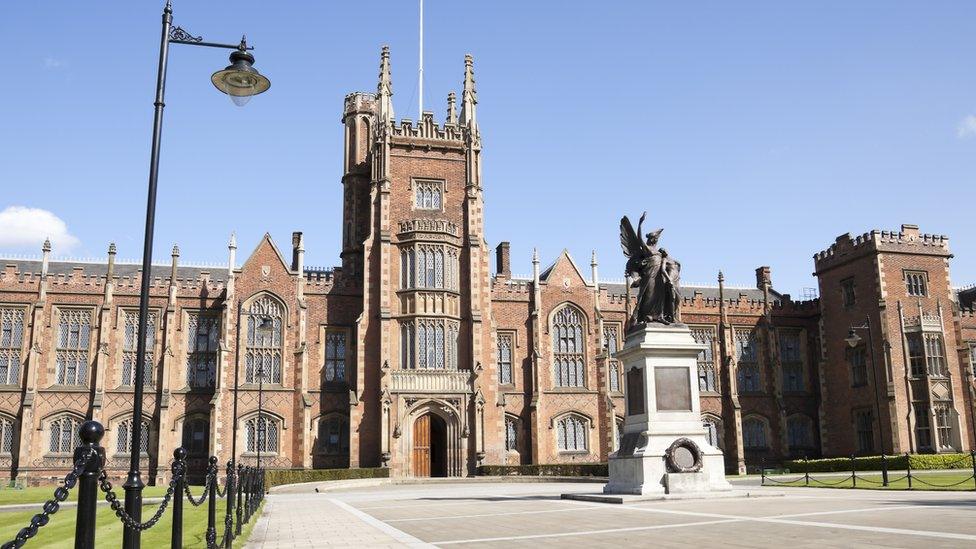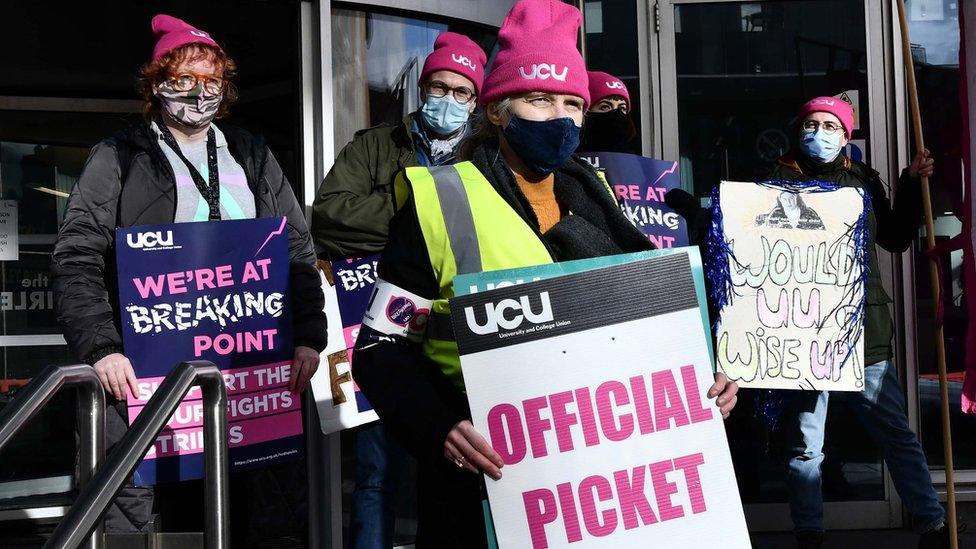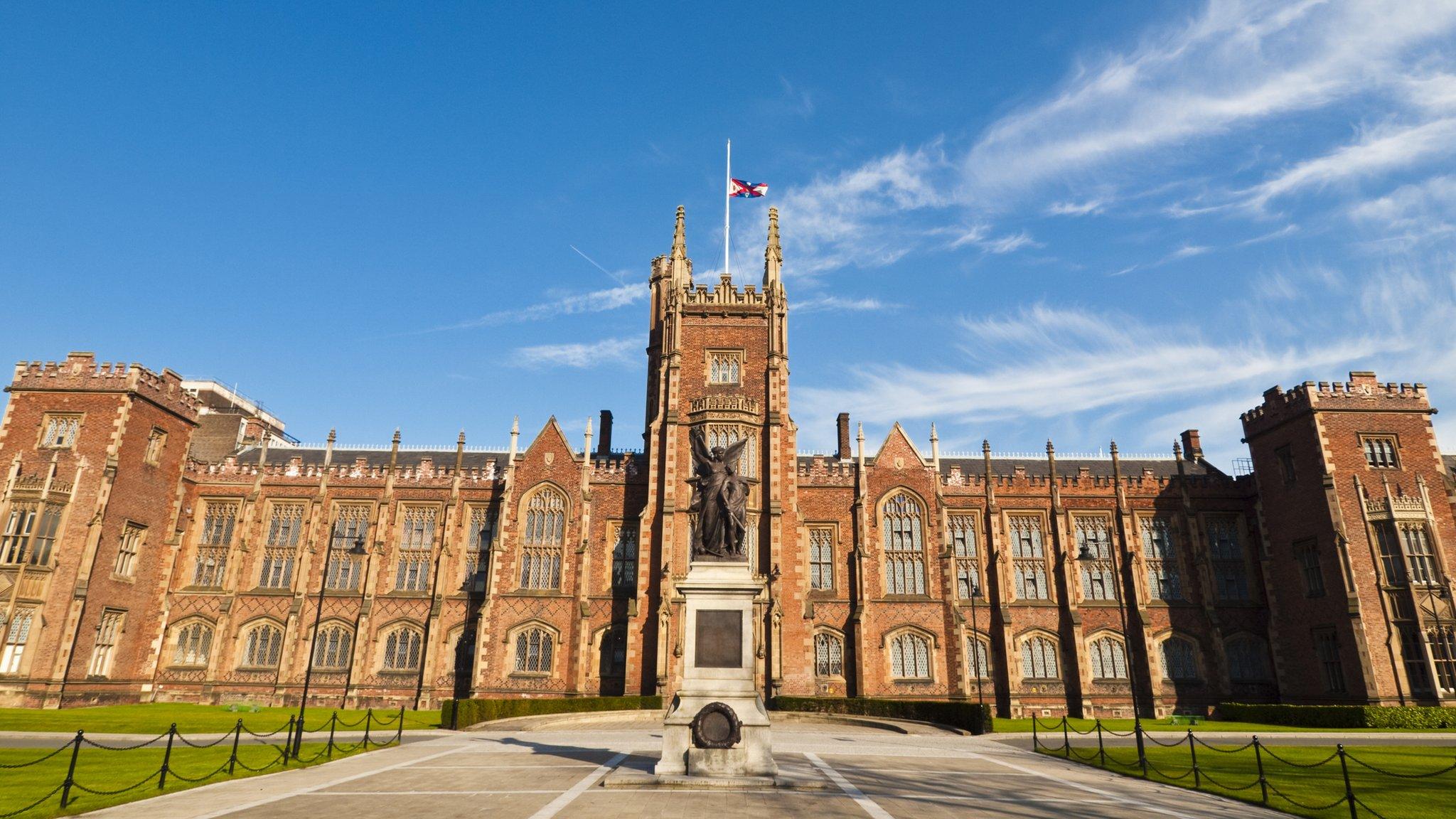Queen's University generated £3bn for UK economy in 2021 - report
- Published

Queen's University is the oldest in Northern Ireland
Queen's University Belfast (QUB) generated about £3bn for the UK economy in 2020-21, new analysis suggests.
The analysis was commissioned by the university but carried out by an independent consultancy firm.
London Economics looked at the economic impact of QUB's research, teaching and learning, students, spin-off companies, procurement and other spending.
Separately, Queen's has warned it could reduce the number of places for NI students if Stormont funding is cut.
The university has modelled how many student places it would have to cut in future if it faced funding reductions from Stormont of between 5% and 15%.
In a response to a query from Belfast City Council, QUB said it would have "no option but to reduce places for Northern Ireland and Republic of Ireland students at a rate of around 525 students per 5% cut".
"This would result in 1,050 or 1,575 fewer places respectively in the case of a 10% and 15% funding reduction," the university's response said.
'Budget will be difficult'
In 2021/22 Queen's University was partly funded by the Department for the Economy (DfE) for 11,869 full-time places for undergraduate students from Northern Ireland and the Republic of Ireland.
In a statement to BBC News NI, the department said it had not yet asked universities and further education (FE) colleges to model the impact of potential budget cuts in 2023-24.
However "as it is anticipated that the 2023-24 budget position will be difficult, it is reasonable for all areas to re-examine their future expenditure requirements," DfE said.
The department - which funds universities and FE colleges - faced a budget cut in 2022/23 and it does not yet know what its budget for 2023-24 will be.
Some staff at Queen's and many other universities in the UK have recently taken strike action in a dispute over pay, workloads and pensions.
Queen's commissioned London Economics to estimate the total economic impact of its activities on the UK in 2020-21.

London Economics regularly carries out analysis of the finance involved in higher education in the UK.
Their analysis for QUB said the university had an estimated impact of £3bn on the UK economy in 2020-21.
In their report with the findings London Economics suggested that as QUB cost £373m to run in 2020-21 it generated more than £8 for every £1 it received in income.
They calculated QUB's £3bn economic impact on the UK by looking at a number of areas of the university and using a range of direct, indirect and modelled factors.
London Economics calculated, for example that a student starting a degree at Queen's in 2020-21 would earn an average of £104,000 more over their working life than a non-graduate.
That would also generate about £93,000 in extra tax for the exchequer.
As about 8,600 students from the UK - mainly from Northern Ireland - started an undergraduate or postgraduate degree at QUB in 2020-21, London Economics calculated the overall economic impact of teaching and learning at the university was £1.06bn.
The economic impact of research at the university, and the money and jobs generated by 38 companies originally set up at QUB totalled just under £1.2bn, according to the analysis.
A further £305m was generated by the tuition fees paid and other money spent by international students during their time studying at QUB.
The university has been increasingly successful in attracting international students, who often pay much higher fees, in recent years.
More than 2,800 international students began an undergraduate or postgraduate qualification at QUB in 2020-21.
Additionally, London Economics calculated the university's spending on staff, products and procurement generated about £480m.
Their report said the money spent by the university supported about 4,400 jobs, the majority in Northern Ireland.
The QUB vice-chancellor Prof Ian Greer welcomed the analysis, saying it showed the university had a "key influence" on the economy and drove economic growth.
Related topics
- Published24 November 2022

- Published8 October 2022
